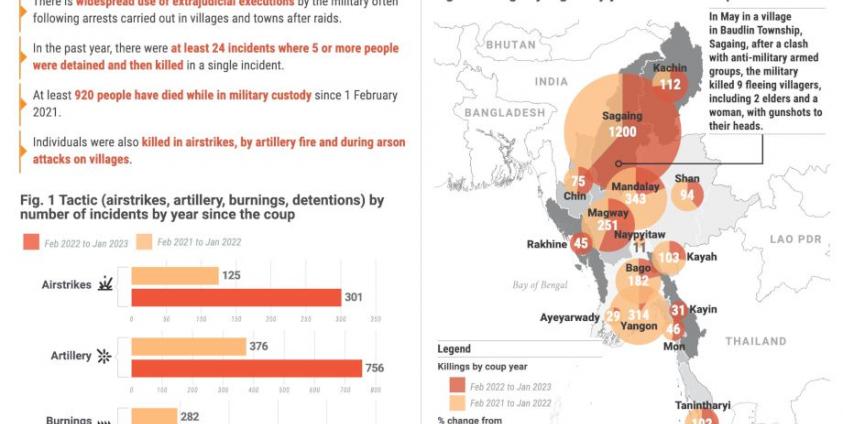Myanmar listed as one of only four countries in the world in which there are extreme constraints for humanitarian access.
The recent emergency report by the International Federation of Red Cross (IFRC) has highlighted the dire situation in Myanmar, where the intensification of armed conflict and fighting, has led to the displacement of 1.5 million people and the destruction of 34,380 civilian homes.
Over the past two years since the military coup in Myanmar, the political and civil instability in the country has deteriorated steadily due to armed clashes, aerial bombardments, and artillery attacks, government troops fighting against ethnic armed organizations, as well as the People’s Defense Forces (PDF) in various regions.
According to statistics up to December 26, 2022,the ongoing armed conflicts and fighting in various states and regions across Myanmar, have resulted in the displacement 1.5 million people due to the military crackdown in Myanmar, and are currently living in precarious conditions in various locations across the country.
Since February 2021, a devastating total of 34,380 civilian buildings, including homes, churches, monasteries, and schools, have been burned down in Myanmar. The northwest region of Myanmar is the area where the largest number of people have been displaced. Out of a total of 795,600 displaced individuals, 47,200 are in Chin State, 124,400 are in Magway, and a staggering 624,000 are in Sagaing.
The ongoing conflict in Chin, Magway, and Sagaing regions has resulted in the blockage of roads due to airstrikes, mortar fire, and ambushes between the People’s Defense Forces and Military Council troops. This has created significant challenges for the delivery of relief and humanitarian assistance to the affected population. The northwest region of Myanmar is the area where the largest number of people have been displaced. Out of a total of 795,600 displaced individuals, 47,200 are in Chin State, 124,400 are in Magway, and a staggering 624,000 are in Sagaing.
The ongoing conflict in Chin, Magway, and Sagaing regions has resulted in the blockage of roads due to airstrikes, mortar fire, and ambushes between the People’s Defense Forces and Military Council troops. This has created significant challenges for the delivery of relief and humanitarian assistance to the affected population.
In the southeast of the country, fighting continues between the military and the KNDF, KNU, PDF joint forces, and in Southern Shan State, Kayah (Karenni), Karen, Mon, Eastern Bago and Tanintharyi regions. As of December 26, 2022, it is said that there are 339,000 displaced people in various townships in the southeastern region.
In Kachin State, there are 3,000 people in Hpakant township alone who have been displaced by the fighting between the KIA and the military.As of August 19, 2022, there are 90,500 displaced people in Rakhine state.
The economic situation is also deteriorating, with blocked transport conditions, currency depreciation, and soaring fuel prices and transport costs have led to a sharp increase in the prices of basic food items. Half of the country’s population is living in poverty due to the current political crisis and the previous Covid-19 pandemic, the report said.
Despite the urgent humanitarian needs in Myanmar, there are significant challenges in delivering aid to the affected population. The barriers to movement, systematic roadblocks, outages to electricity and internet lines, and widespread interrogations at checkpoints, have made it extremely difficult for aid organizations to reach those in need.
Furthermore, the recently promulgated association registration law has placed significant restrictions on the ability of international NGOs, local NGOs, and civil society organizations (CSOs) to provide assistance in Myanmar. ACAPS2 identified Myanmar as one of only four country contexts in the world in which there are extreme constraints for humanitarian access.
Although a ceasefire was agreed between the Military Council and the Arakan Army (AA), the fighting that occurred between August and November of 2022 resulted in the deaths of 42 civilians.







